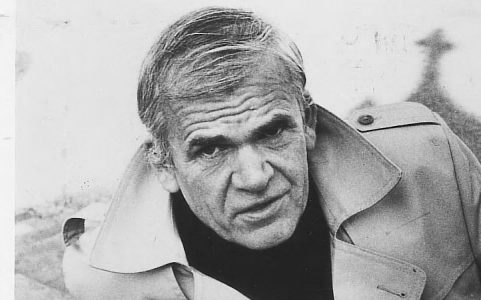
Milan Kundera
Milan Kundera is a French writer, with Czech origins. Born in 1929 in Brno, at the time Czechoslovakia, and currently Czech Republic, Kundera comes from a middle class family; his father was a pianist, and he was introduced to the arts world at an early age, starting to learn to play the piano with his father during his childhood, and later studying music. This precocious connection to music created a bond that was kept throughout his adult life, and the author often explores this theme in his books, whether through a direct reference to recognized musicians, or evoking music as a present entity that links characters.
After finishing high school in his hometown Brno, Milan Kundera moved to Prague, where he started studying Literature and Aesthetics at the Arts Faculty, in Charles University. However, before obtaining his Bachelor’s Degree, Kundera requested a transfer to the Film Faculty of the Academy of Performing Arts, where he dedicated himself to the study of Directing and Screenwriting. In 1952, Kundera finished his studies, and was invited to become a teacher of World Literature in the same institute, which he accepted.
In parallel to his academic life, Kundera has revealed strong political convictions since his adolescence, mostly due to the impact that World War II and the consequent German occupation and in his early years. He joined the Communist Party in his teens, in Brno, and after moving to Prague Kundera maintained strong connections to the Party, despite the problems and conflicts that arose from this. While still studying in the Film Faculty, in 1950, he was expelled of the Party, accused of activities against the Communist ideology; later on, he was readmitted, only to be kicked out again in 1970, due to his participation in the Prague Spring, a period of revolution and political liberalization that spread to the entire Czechoslovakia, but that was soon stopped by the soviet invasion. Milan Kundera stayed in his home country for a few more years, fighting for the Communism Reform in Czechoslovakia, but eventually, during 1975, he was forced to abandon the country, and chose France as his new home address, where he continued teaching at the University of Rennes. Later, in 1981, Milan Kundera obtained French nationality, he declares himself to be French and wants his work to be classified as French literature, despite the strong and clear influences of his life in Czechoslovakia and Communist ideology in his writings.
Even though he has always shown interest in Literature, having even started to study it in his first academic experience at the University, and later as a Literature teacher, except for a few poems, Milan Kundera only started his writing activity at the age of 38 years old. His first romance, “The Joke”, published in 1967, is a strong critic to the Communist Totalitarianism lived in Czechoslovakia at the time. After the soviet invasion, the publication of this book, or any other work from Kundera was prohibited; some years later, after he was already stablished in France, his Czech nationality was withdrawn. In France, Kundera continued to work in new books, and he even started to write in French. “The Unbearable Lightness of Being”, the book that gave him world recognition from the public and specialized critic was published in 1984, and was adapted to the cinema in 1987. Some of his most know novels are “Life is Elsewhere”, “The Farewell Waltz”, “The Book of Laughter and Forgetting” or “Immortality”.
Besides the common references to music and communism, that played an important role in the author’s life, all Kundera’s books have strong philosophical traits, with dualities and parallelism that oscillate between tragedy and comedy, with an evident dream-like strand. In addition to his fictional work, Milan Kundera also writes essays, mostly regarding literary themes, and has also written some short stories, poems and theatre plays.




